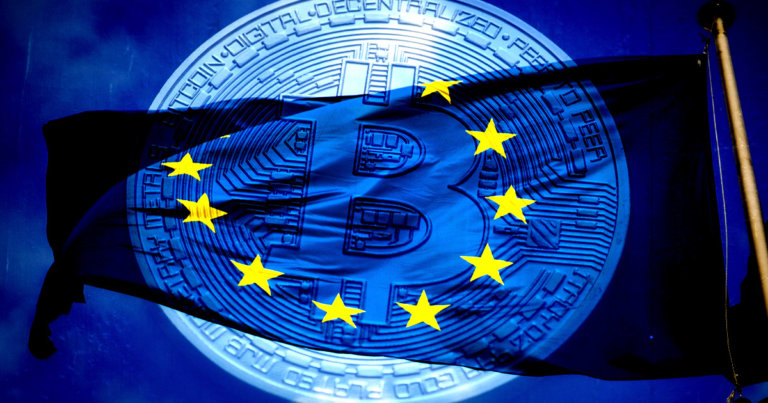 Today’s EU MiCA vote could ban exchanges from listing proof of work crypto assets
Today’s EU MiCA vote could ban exchanges from listing proof of work crypto assets Today’s EU MiCA vote could ban exchanges from listing proof of work crypto assets
The wording in the current MiCA report would cause crypto service providers to issue a proof of work ban for 'unsustainable' crypto assets.

Cover art/illustration via CryptoSlate. Image includes combined content which may include AI-generated content.
The latest draft of the controversial MiCA report still contains language that could stop crypto service providers from transacting in proof of work coins. As a result, a potential proof of work ban is now possible in Europe. Earlier this month, the MEP responsible for reporting on MiCA, Dr Stefan Berger, confirmed that the contentious Article 61 paragraph 9c had been removed.
Berger, who lists his role in the MiCA committee in his Twitter bio, believes that the regulatory changes will be pioneering in terms of innovation for the crypto markets. Similarly to Biden’s executive order, the MiCA focuses primarily on protecting citizens when investing in crypto assets.
Troubling wording for Bitcoin
However, the MiCA report includes some wording far removed from the White House document. If passed, the EU act would effectively ban exchanges from listing any crypto asset that doesn’t meet their ‘environmental sustainability criteria’.
9b. Crypto-asset service providers shall not provide services related in any way, shape, or form to crypto-assets that do not meet the environmental sustainability criteria in accordance with Article 3a. In particular, they shall not facilitate the purchase or trading of such crypto-assets and shall not offer custody services for such crypto-assets.
Finding the definition of “environmental sustainability criteria” was not easy as Article 3a does not exist in the original document. However, a closer look at the latest revisions reveals the EU’s definition of an unsustainable crypto asset. A crypto asset is unsustainable if:
“It might have a significant environmental impact when operated at a sufficiently large scale, considering the consumption of energy, the use of real resources, carbon emissions, electronic waste and specificities of the incentive design.”
This buried definition makes the current report just as damming for Bitcoin as the earlier version. To make things worse for European crypto investors, a further amendment in the latest version states that the act will require all crypto services to introduce KYC and AML procedures.
1. All crypto-assets service providers shall have in place internal control mechanisms and effective procedures for prevention, detection and investigation of money laundering and terrorist financing and other criminal activities, in accordance with Directive (EU) 2015/849.
Another clause that declares that all exchanges will also be required to ensure “full traceability of any transaction over EUR 1000″ will likewise not go down well with the privacy consciousness crypto community. They will also be required to make information available to authorities on request, monitor, freeze assets of any person subject to sanctions and hold the physical address of the originator of the transaction.
Reaction to potential proof of work ban
Ledger issued a statement on Friday entitled “Stand for Financial Freedom: Our Position on MiCA’s Proof of Work Ban”. The article claims that “[t]he innovative and growing digital asset economy in Europe will vanish” if the act passes. They go further, asking supporters to E-mail, call or tweet their MEP to attempt to stop the act from progressing as it stands.
Pierre Person, MEP for Paris, commenting on the report remarking,
“As it stands, it definitively condemns the future of crypto-assets in Europe. By banning Bitcoin and Ether, by complicating the use of NFT and DeFi, the European Parliament is mortgaging our monetary and financial sovereignty.”
Person’s statement clarifies that there is no unanimous support for the report, so it is not sure to pass. However, some facets of the report will likely receive unilateral support. Articles such as requiring all crypto projects to issue a white paper as well as a clear list of agreed definitions of new blockchain technologies will be well received.
With a need to put a stake in the ground regarding crypto, it may come down to negotiations post-vote to attempt to remove amendments that would ban proof of work coins.
What happens now?
The agenda for the session can be found on the EU Parliament website. First, they will vote to accept the current draft of the legislation and whether to enter into Interinstitutional negotiations. Interinstitutional negotiations involve trilogues which are the last stage before a provisional agreement is made up and the act is then adopted.
Interested parties can find the current draft of the report and amendments online. A full breakdown of all documents and associated parties is available on the Legislative Observatory. Having read the full report along with most of the amendments, it is evident that there has been a lot of research done to create this document.
There is an understanding of distributed ledgers and blockchain technology as a whole that far outweighs that of the average investor. It personally gives me some hope that we could end up with regulation that fosters growth in crypto as an asset class rather than hindering it. That may be too idealistic, but I will say this; I have seen worse.
The regulatory proposals contained in this report are much further reaching than those in Biden’s Executive order, which mainly focused on creating research committees. There certainly seems to be a focus on digital asset regulation in 2022. Will the new legislation be well received by the crypto community? If Bitcoin is banned in Europe, I cannot imagine it will.
Interestingly, none of the new EU regulations will apply to “the European Central Bank, national central banks of the Member States when acting in their capacity as monetary authority or other public authorities”.
If you wish to have your say on the matter, you can search for the name of your local MEP on the European Parliament website.












































































































